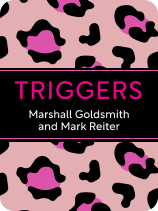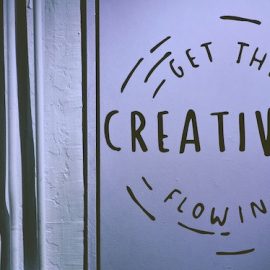

This article is an excerpt from the Shortform book guide to "Triggers" by Marshall Goldsmith and Mark Reiter. Shortform has the world's best summaries and analyses of books you should be reading.
Like this article? Sign up for a free trial here.
Do you struggle to resist your impulses? How does acting on impulse prevent you from achieving your goals?
Our impulses often get the better of us, prompting us to behave in ways that contradict our best interests. In their book Triggers, Marshall Goldsmith and Mark Reiter explain how to stop impulsive behavior by identifying your “triggers”—stimuli and situations that prompt you to react impulsively.
Here are three strategies for keeping your behavior in check so that you can stay on track toward your goals.
1. Cultivate Awareness
If you want to know how to stop impulsive behavior, the first tip is to focus on cultivating awareness and practicing engagement. These are two tools that the authors assert will help you to notice the triggers in your environment and become more capable of responding to them in positive and productive ways. Think of a trigger as a catalyst: Normally, the catalyst sets off a chemical reaction. But you can add that moment of awareness as an inhibitor to stop the reaction.
We tend to think of many of our reactions as automatic, but they aren’t. If you train yourself to become aware of the impulse, then you can interrupt the progression from experiencing a trigger to reacting to that trigger. And when you engage, then you can choose how to act.
| Why Engaging With the Present Is Essential The book’s lessons on awareness take on additional nuance when you learn that Goldsmith has been a “philosophical Buddhist” for decades. He points out that one of the core tenets of Buddhism is that everything we are and have is impermanent. Your thoughts, emotions, achievements, and possessions are fleeting, and the person you are one moment is not the same as the person you will be in the next. Therefore it makes a lot of sense to engage with the present moment. Psychiatrist Mark Epstein, a practicing Buddhist, takes this a step further. Epstein believes that many of us cling too tightly to stories and feelings that have a hold over us and our happiness. So, just as Goldsmith describes paying attention to your triggers but not acting on your natural impulses to respond to them, Epstein recommends simply observing those persistent thoughts or feelings and letting them be what they are. |
2. Remember to React Positively
You can’t become the person you want to be without learning to react in positive ways to unexpected triggers. It might help you just to remember this focus on positivity. Or, you can use structure to limit your options and attenuate your focus, which leads to better decisions that align with your long-term goals.
For those inclined to use a mantra, Goldsmith and Reiter recommend asking yourself: “Am I willing, at this time, to make the investment required to make a positive difference on this topic?” They shorten it to the acronym “AIWATT.”
(Shortform note: Acronyms like “AIWATT” can aid memory or learning and help you remember abstract concepts—as long as you make them work for you. Joshua Spodek tweaked Goldsmith and Reiter’s acronym to make it easier to remember and apply. “AIWATT” becomes “WINDETIT,” which stands for “Will I now do enough to improve this?” Spodek’s version still reminds you to focus on positive actions in a more self-contained form than Goldsmith and Reiter’s.)
Whether or not you use the acronym, you can focus on responding in positive and productive ways. Remind yourself of what you need to do in the present moment and consider whether the action you want to take would make the best use of your time, energy, and resources.
(Shortform note: Staying in the present moment and making thoughtful decisions is a form of mindfulness. Though people use the term in a few different ways, mindfulness is technically a meditation practice that involves focusing your awareness on what you’re currently experiencing without judging it or trying to interpret it. By focusing on the present moment and paying attention to what’s happening around you, you can break out of negative patterns and take a more balanced view of the situations that might typically throw you off track during your day.)
3. Compensate for Flagging Self-Discipline
When you know that a situation will test your ability to resist your triggers, you can add even more structure to keep your behavior in line. The writers recommend adapting the salient “daily questions” to check in with yourself more frequently during a challenging situation, as often as every hour. By continually restating your goal (and holding yourself accountable), you create a structure that helps you to practice self-discipline.
Questioning yourself each hour of a demanding workday or a weekend with your in-laws can help you stay aware of your behavior. So even if you don’t score perfect 10s, you’ve still gained the advantage of awareness.
(Shortform note: An additional benefit of checking in with yourself frequently in stressful situations is that you’ll have more opportunities to label your emotions. Scientists say that labeling difficult emotions can make them feel less urgent and distracting. Similar to Goldsmith and Reiter, some experts recommend checking in with yourself hourly on challenging days so that you can notice and label your emotions and thereby reduce their power over you.)
| What Scientists Do and Don’t Know About Behavior Change Does behavior change work the way Goldsmith and Reiter think it does? It’s hard to know. However, researchers at the NIH’s Science of Behavior Change (SOBC) program are studying the underlying processes that determine why people fail or succeed at changing their behavior. Scientists don’t yet fully understand the mechanisms of behavior change, and research often focuses on the changes that help people live healthier lives. But this work might also help us map what happens in your brain when you implement an intervention (like Goldsmith and Reiter’s daily questions) and see a change in your behavior. Even though there’s still a lot that scientists don’t know, psychologists do offer a few tips on how to stop impulsive behavior, such as: – Thinking about your decisions instead of making them on “autopilot” – Considering the future benefits of changing your behavior now – Identifying stress triggers to anticipate when you might be in a situation that could derail your behavior – Finding people who can support you through the changes you want to make |

———End of Preview———
Like what you just read? Read the rest of the world's best book summary and analysis of Marshall Goldsmith and Mark Reiter's "Triggers" at Shortform.
Here's what you'll find in our full Triggers summary:
- What triggers are and how to recognize them
- Why triggers are so effective at affecting your behavior
- Tools and strategies for resisting and avoiding your triggers






